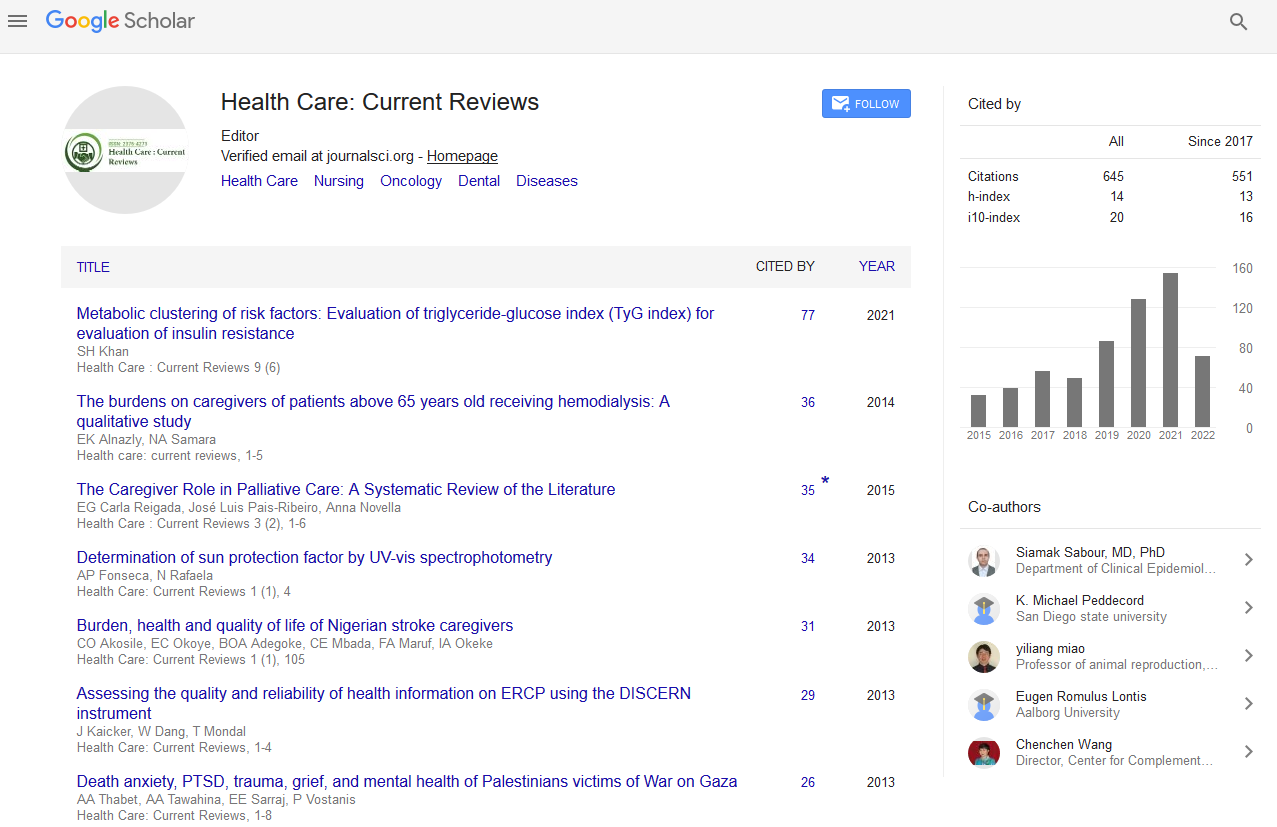PMC/PubMed Indexed Articles
Indexed In
- Open J Gate
- Academic Keys
- RefSeek
- Hamdard University
- EBSCO A-Z
- Publons
- Geneva Foundation for Medical Education and Research
- Google Scholar
Useful Links
Share This Page
Journal Flyer

Open Access Journals
- Agri and Aquaculture
- Biochemistry
- Bioinformatics & Systems Biology
- Business & Management
- Chemistry
- Clinical Sciences
- Engineering
- Food & Nutrition
- General Science
- Genetics & Molecular Biology
- Immunology & Microbiology
- Medical Sciences
- Neuroscience & Psychology
- Nursing & Health Care
- Pharmaceutical Sciences
Stress and burnout among medical students: Exploring the differences between female and male millennials
Global Healthcare & Fitness Summit
July 20-22, 2015 San Francisco, USA
Stefanie A Bughi
Keynote: Health Care: Current Reviews
Abstract:
Objective: Stress and burnout are commonly reported among millennial medical students. A medical student’s perception and
response to stress can affect their health, delivery of quality care and practice of patient safety. The purpose of this study is to
explore the prevalence and gender differences in burnout and coping mechanisms used in a sample of third-year, millennial
medical students rotating at a Southern California hospital.
Method: A cross-sectional study was conducted with 139 third-year, medical students. Questions regarding perception and
management of stress were administered. Burnout and associated characteristics of emotional exhaustion, cynicism and
decreased professional efficacy were assessed. The validated instrument used for this was the Maslach Burnout Inventory-
Student Survey (MBI-SS). Descriptive and chi-square analyses were performed.
Results: In this sample, 114/139 (82.0%) students reported their gender: 55/114 (48.2%) females and 59/114 (51.8%) males.
The mean age was 26.4±3.72 years old. Emotional exhaustion, cynicism and decreased professional efficacy were prevalent
among the students with 19/139 (13.8%) reporting high-level scores on all three burnout characteristics. Statistical significant
gender differences (p<0.05) were found regarding perception and management of stress. Compared to females, more males
noted that stress did not bother them (χ²=4.509, p<0.05) or they did not pay attention to stress (χ²=4.961, p<0.05). However,
with respect to stress management, female students were more likely than their male counterparts to eat sweets (χ²=4.431,
p<0.05), practice yoga (χ²=5.719, p<0.05) or seek professional help (χ²=4.373, p<0.05).
Conclusion: Burnout is frequently experienced among third-year medical students suggesting a need for early effective
wellness interventions in medical training. Further assessments regarding how medical students perceive and respond to stress
including potential gender differences is recommended.
Biography :
Stefanie A Bughi is a Clinical Associate Professor of Medicine at the Keck School of Medicine, University of Southern California Los Angeles. He attended
the University of Bucharest; School of Medicine in Romania, he has completed his Internship and Residency in Internal Medicine at Hahnemann University
Northeastern Pennsylvania Affiliated Hospitals and fellowship in Endocrinology at LAC+USC Medical Center in 1989. He joined the Clinical Faculty at USC Keck
School of Medicine in 1989. Presently, he works as a Physician Specialist at Rancho Los Amigos National Rehabilitation Center, where he also serves as Patient
Safety Officer, Chair of the Physician Well-Being Committee and Chair of the Graduate Medical Education. His research interests include the endocrinology of
stress, the implications of stress on psychosomatic disorders, and the well-being of health-care providers. He has actively participated at Rancho’s Annual Women’s
Health Conference, where in the last five years he has presented topics such as: “7 Habits of Successful Aging,” “ Re-setting the Biological Clock,” “ Role of Minerals
and Supplements in Healthy Aging” among others.


